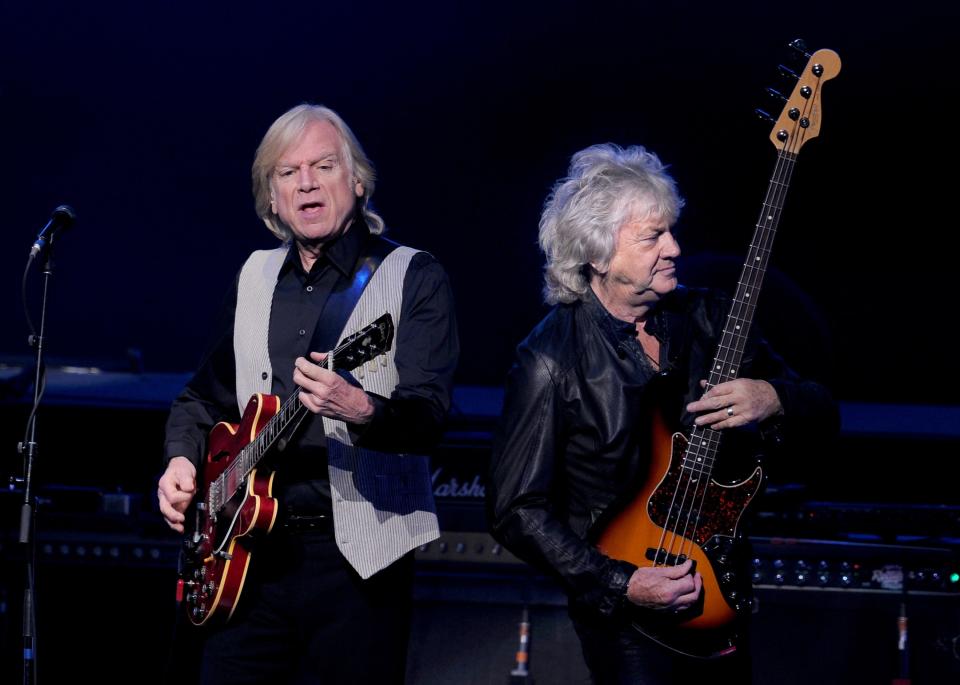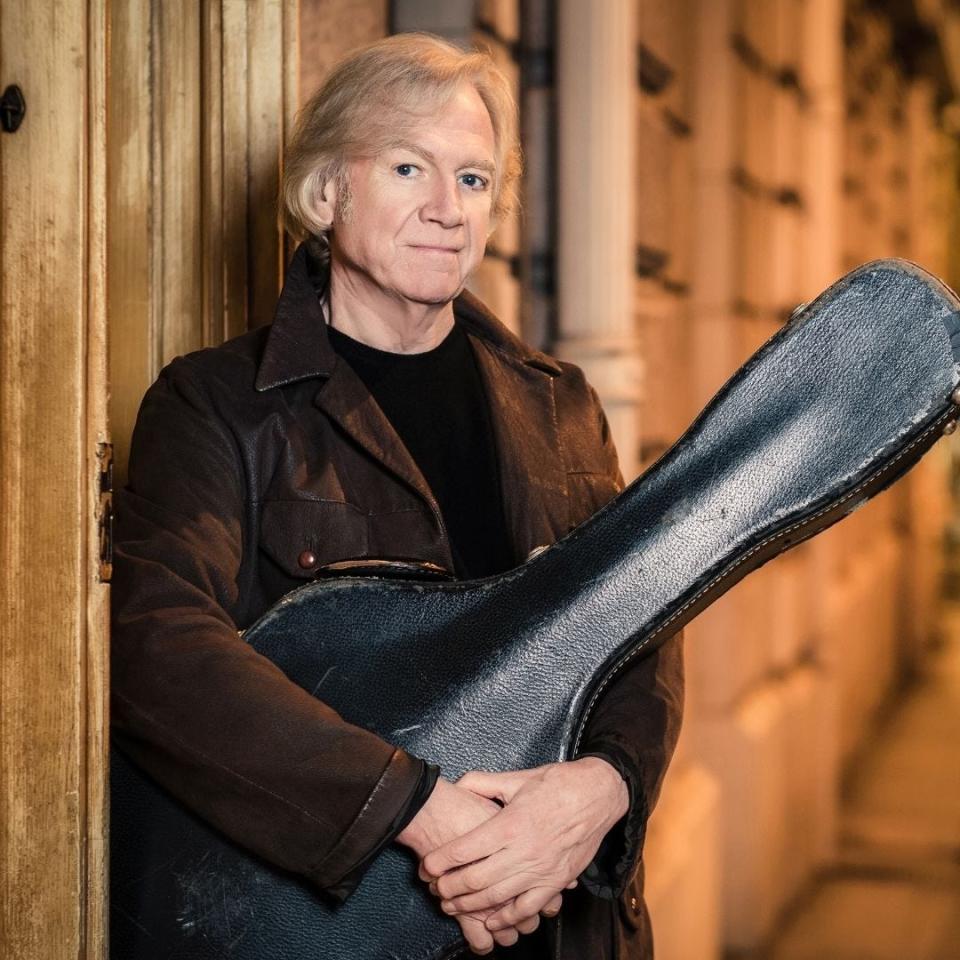'The world had moved on.' How Moody Blues joined a revolution with 'Days of Future Passed'
- Oops!Something went wrong.Please try again later.
- Oops!Something went wrong.Please try again later.
- Oops!Something went wrong.Please try again later.
- Oops!Something went wrong.Please try again later.
When Justin Hayward joined the Moody Blues, they were essentially a British beat group whose live shows were loaded with R&B covers, as brilliantly captured on 1965's "The Magnificent Moodies."
The year was 1966 and Hayward had been called in to replace guitarist Denny Laine, the voice of "Go Now," which had topped the U.K. charts, with John Lodge joining that same year on bass.
"I came to the group as a songwriter," Hayward recalls in advance of his concert at Phoenix's Celebrity Theatre on Thursday, May 19.
"Mike Pinder, the keyboard player, called me when Denny left. Because it was a cover version band. It was rhythm & blues — interesting, good and professional for the time. But Mike was a songwriter, too, and he wanted to find a way to do his own songs."
Top concerts playing Phoenix in May: Olivia Rodrigo, Snoop Dogg, Coldplay, Eric Church, more
Moody Blues decide to do their own songs
At first, they attempted to move on without necessarily moving on.
"We just weren't very good at the rhythm & blues cover thing," Hayward says.
"It was a bit pointless somehow. But they were paying the rent. So by the end of 1966, we were doing two 45-minutes sets — one which was rhythm & blues covers and then our second 45 minutes would be our own material."
They were still wearing matching blue suits at the time.

"And we looked very elegant," Hayward recalls. "But it was dated already. The world had moved on."
It all came to a head in the van driving home from a difficult week of shows.
"We just agreed we've got to do our own songs," Hayward says.
"No blue suits anymore. Just be us, do our own songs and see what happens. Because we had nothing to lose. If you've got nothing, it doesn't matter."
'Well, I went and won': How an Arizona guitarist took home top honors at a major blues competition
The making of 'Days of Future Passed'
The Moodies' first attempt at updating their sound was 1967's "Fly Me High," written by Hayward.
In May of that same year, they entered Decca Studios in London with producer Tony Clarke to start work on an album titled "Days of Future Passed."
Their label, Decca, had been experimenting with stereophonic sound on classical recordings, and presented the idea of interweaving their material with classical recordings arranged by Peter Knight.
"We recorded our songs for 'Days of Future Passed,' which was mostly our stage act," Hayward says.
"Nights in White Satin" and "Dawn is a Feeling" had been kicking around for a while by then.
"In fact, 'Nights' was recorded by the BBC back in May of that year," he recalls. "But it became perfectly part of the 'Days of Future Passed' album."
'John Lennon got it': Micky Dolenz reflects on the Monkees' proper place in music history
The orchestrations were done in a three-hour session that Hayward "was lucky enough to attend" with Knight conducting the London Festival Orchestra.
"They just ran through it one time," Hayward says. "Wonderful orchestral players. Then they had a tea break. And then they recorded it from beginning to end, the whole 48 minutes, and that was it."
It was Knight who first approached them with the concept for the album, having gone to see them play at the 100 Club on Oxford Street.
"He was so well-respected at Decca, the musicians knew that if Peter had written these orchestrations, it was going to be good," Hayward says.
"So there was no fiddling around. It wasn't like 'Oh, I'm just doing a pop session where I'm doing a string line for three minutes.'"
Could this be King Crimson's final US tour? A conversation with bassist Tony Levin

The slow rise of 'Nights in White Satin'
The album was a moderate success at first, but slowly gathered steam, finally cracking the U.S. Top 10 five years later, a breakthrough largely fueled by FM airplay of "Nights in White Satin," a single written and sung by Hayward with a spoken-word poem recited by Pinder.
Hayward credits "the birth of FM radio and disc jockeys not having to do Top 40 stuff all the time" for the single's success.
Another factor was people becoming more interested in owning nice stereo systems.
"We were lucky enough that we were with Decca," Hayward says.
"Their whole ethos was about the quality of sound. So we were lucky to have beautifully recorded records. It wasn't just about singles that had a solid middle sound to them with not much else. It was full frequency stuff."
"Nights in White Satin" eventually hit No. 2 on Billboard's Hot 100, where it spent two weeks.
'The best band in the world' and why he quit: A conversation with Steve Hackett of Genesis
'We just kind of drifted apart'
That same year, 1972, produced their first chart-topping U.S. album, "Seventh Sojourn," which featured a hit single written and sung by Lodge, "I'm Just a Singer (In a Rock and Roll Band)."
By that point, they'd amassed a string of U.S. pop hits — "Go Now," "Tuesday Afternoon," "Question," "The Story in Your Eyes," "Isn't Life Strange" and "Nights in White Satin."
Shortly after the success of "Seventh Sojourn," they went on hiatus in 1974 with Hayward and Lodge collaborating on an album titled "Blue Jays" the following year.
Hayward also recorded the Top 5 U.K. single "Blue Guitar" with 10cc but released it as Hayward and Lodge before launching his solo career in earnest with the aptly titled "Songwriter."
The same year Hayward's solo album hit the streets, 1977, the Moodies reunited.
"We came back to put an album together for Decca," Hayward says. "But it didn't suit Mike, and it didn't suit our producer Tony Clarke. Fortunately, nothing was said that couldn't be unsaid. But we just kind of drifted apart."
Pinder quit before they finished tracking "Octave" and his bandmates soldiered on without him, recruiting Patrick Moraz of Yes to tour on the album.
"In a way, that started a new era," Hayward says.
'You just have to follow your heart': How Coldplay's Chris Martin learned to trust himself

'Wildest Dreams' come true in the '80s
The '80s got off a promising start when the "Long Distance Voyager" album topped the U.S. charts and ushered in another wave of big hit singles in the States, from "Gemini Dream" and "The Voice" to "Your Wildest Dreams" and "I Know You're Out There Somewhere."
"Through the '80s, we were lucky enough to really have some pop hits, which was a real joy," Hayward says.
"I kind of missed it the first time. I was elsewhere, mystically, emotionally and a lot of ways chemically as well. But the second time round, I was present, awake and aware. And it was wonderful."
Hayward was a huge fan of music of that era.
"If I could only have one decade of music, it would be the '80s," he says.
He especially enjoyed working with Tony Visconti, a producer best known for his work with David Bowie and T. Rex. Visconti started working with the Moodies on "The Other Side of Life," which spawned their biggest '80s hit, "Your Wildest Dreams."
Hayward loved Visconti's disciplined production style, "not hanging around for weeks trying to make a song, just doing it and committing to it."
David Bowie remembered: Tony Visconti reflects on 45-year history with Bowie
The Moody Blues' Hall of Fame induction
The Moody Blues gave their final performance at their 2018 induction to the Rock and Roll Hall of Fame, an honor that ended up being a bit more meaningful than Hayward had anticipated.
"If you're European or British then it's not something you think about a lot," Hayward says.
"But for the American fans, it was really important. And the more it was talked about, the more I realized that it was a wonderful thing to happen to us and I'm so glad it did."
In addition to still touring, Hayward has new music coming out this year. And he enjoys revisiting the days of "Days of Future Passed" in concert with guitarist Mike Dawes and Julie Ragins, who toured with the Moodies for many years on vocals and keyboards, and Karmen Gould on flute and vocals.
The joy of rediscovering the songs on tour
They're performing the songs on which his legacy has come to rest in arrangements the songwriter feels are much closer in spirit to how he envisioned the material.
"We're presenting the songs kind of as they were written," he says.
"So it's a joy for me to rediscover these songs again, some things I only played for two or three days when they were recorded. You sort of maybe touch the essence of them a bit clearer in this format, because you can't sort of hide behind a drum kit."
He's been rotating songs in and out of the set.
"But there's a few things that I have to play, because I wouldn't get off stage without playing them, really," he says, with a laugh.
As luck would have it, he still enjoys playing the songs he has to play.
"The big songs I've done over the years, you can do them in soundcheck and you can get everything pretty perfect," he says.
"But when there's an audience there, it brings some magic into the room that couldn't possibly exist in any other way. And that really is a joy. The audience bring something to it and there's something that's created in that moment."
Justin Hayward
When: 7:30 p.m. Thursday, May 19.
Where: Celebrity Theatre, 440 N. 32nd St., Phoenix.
Admission: $45-$75.
Details: 602-267-1600, celebritytheatre.com.
Reach the reporter at ed.masley@arizonarepublic.com or 602-444-4495. Follow him on Twitter @EdMasley.
Support local journalism. Subscribe to azcentral.com today.
This article originally appeared on Arizona Republic: Moody Blues' Justin Hayward still loves playing classic songs on tour


